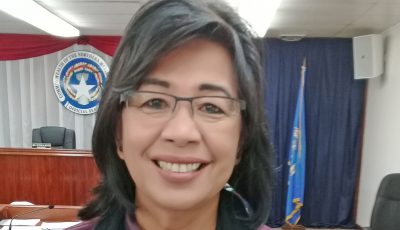‘Nothing bars Tinian delegation from amending the casino law’
Superior Court Associate Judge David A. Wiseman ruled yesterday that Article 21 of the CNMI Constitution does not bar the Tinian Legislative Delegation from amending the revised Tinian Casino Gaming Control Act.
Wiseman cited Article 21 that states, “Gambling is prohibited in the Northern Mariana Islands except as provided by Commonwealth law or established through initiative in the Commonwealth or in any senatorial district.”
Wiseman said the Tinian Casino Gaming Control Commission has not identified language in Article 21 that contains an express restriction on amending a local gambling law.
The judge discussed the local gambling law in his order that denied TCGCC’s motion that requested the court to declare invalid three local laws: Tinian Local Law 14-1, Tinian Local Law 18-5, and sections of the Tinian Local Ordinance 18-3.
Tinian Local Law 14-1 amended the revised Tinian Casino Gaming Control Act by enacting provisions, “to regulate the building and licensing of a hotel-casino in phases, to authorize and regulate the employment in the casino of persons over the age of 18 years; to reduce the casino license application fee, to reduce the penalties for fees and taxes, to authorize the TCGCC to waive or defer payment of such penalties, to permit and regulate credit wages; and for other purposes.”
Tinian Local Law 18-5 amended the revised Tinian Casino Gaming Control Act by enacting provisions, “for the purpose of updating the casino gambling tax to adapt to Asian-style gaming and to boost the Asian ‘high roller’ gaming market.”
A section of Tinian Local Ordinance 18-3, the Tinian Municipal Appropriations Act of Fiscal Year 2015, state that “no funds shall be programmed from personnel and non-personnel accounts to other personnel accounts to increase any salary from its current level…”
Another section of Tinian Local Ordinance 18-3 states that “no position or FTE pay level approved by this Act shall be increased and the funds appropriated herein shall not be reprogrammed to increase any pay level…”
The other section of Tinian Local Ordinance 18-3 states that “notwithstanding any law to the contrary and except as provided for in subsection (b) of this section, the funds appropriated pursuant to this Act shall not be used to increase the salary of any employee or any position from its current level or new level as set forth and appropriated by this Act.”
The commission, executive director Lucia L. Blanco-Maratita, and TCGCC inspector Lisa-Marie B. Aguon are suing Tinian Mayor Joey P. San Nicolas and Tinian municipal treasurer Charlene M. Lizama for regusing to pay them the salaries that the commission had increased in December 2014.
San Nicolas paid only the salary amount as allocated in the Budget Act.
TCGCC chair Mathew Masga, vice chair Bernadita Palacios, and commissioner Lydia Barcinas intervened in the lawsuit after the mayor asserted that their terms had already expired and that he would appoint three new commissioners.
The Mayor’s Office then filed a motion to dismiss. The commission, Blanco-Maratita, and Aguon filed a motion for summary judgment. The Mayor’s Office also filed a cross-motion for summary judgment.
Wiseman heard the motions last Sept. 1.
Last Sept. 16, Wiseman granted San Nicolas’ and Lizama’s motion to dismiss them in their individual capacities from the lawsuit.
Yesterday’s ruling refers to the motions for summary judgment.
In denying the commission’s motion yesterday, Wiseman said the relevant express restriction only states that the local legislative body may not establish gambling by local law.
“Therefore, the court does not find that Article 21 prohibits amendments to a local gambling law,” the judge said.
Wiseman said that following Article 21’s enactment, the electorate of two senatorial districts enacted casino gaming laws: the second senatorial district, consisting of the islands of Tinian and Aguiguan in 1989; and the third senatorial district, consisting of Rota, in 2007.
Finally, the judge said, the 18th CNMI Legislature enacted Public Law 18-38, “enacted pursuant to Article 21 of the Constitution, in order to authorize, establish and provide for casino gambling and wagering in the Commonwealth,” in 2014, 36 years after the Commonwealth first enacted casino gambling.
Wiseman said the Constitution is silent as to whether a local law enacted by local initiative may be later amended by the local legislative body.
He pointed out that in 2008, the Legislature recognized this specific problem and passed an amendment to the Local Law Act of 1983, Public Law 16-4, signed into law as codified in 1 CMC Section 1409.
Under Section 1409, a local law enacted by local initiative, “may be amended, altered, repealed, superceded or altered in any fashion by the enactment of a subsequent local law enacted by the delegation.”
Therefore, the judge pointed out, under both the Constitution and by statute, a local law enacted by local initiative may be amended by the local legislative body to the same extent as any other law, absent an express constitutional prohibition.
Wiseman said the primary constitutional question before this court, then, is whether Article 21’s prohibition on gambling contains an express constitutional prohibition on legislative amendments to local gambling laws.
The commission argued that Michigan case law and the language of Article 21 supports a finding that the Tinian Legislative Delegation may not amend the revised Tinian Casino Gaming Control Act.
Wiseman is, however, not convinced.
Wiseman said in the alternative, the commission argued that Article 21’s language contains a restriction on amendments to any local gambling law; specifically in the word “as.”
Article 21 states that “gambling is prohibited in the Northern Marianas except as…established through initiative…in any senatorial district.”
The commission argued that “as” means “in the same manner in which.”
Therefore, according to it, any amendment to the revised Tinian Casino Gaming Control Act would defeat the same manner in which, or the particularities of the Act, as initially submitted to the voters in 1989.
Wiseman said the court recognizes an inherent ambiguity in the use of the word “as.” However, without more, the court is not persuaded that such ambiguity exists in the context of the plain language of Article 21, he said.
Even if “as” resulted in an ambiguous reading of the constitutional provision, the judge said, such interpretation is not supported in the constitutional history of Article 21.
Wiseman said he does not find that an ambiguous phrase within Article 21, one resulting from usage of the word “as,” restricts the Tinian Legislative Delegation from amending the revised Tinian Casino Gaming Control Act.
Wiseman said because the court finds that a local legislative body may amend an already-established local gambling law, the court also finds that Article 21 does not bar the Tinian Legislative Delegation from amending the revised Tinian Casino Gaming Control Act.
The commission argued that Tinian Local Ordinance 18-3 is unconstitutional because it violates the constitutional separation of powers as recognized in the court’s previous decision.
Specifically, the commission alleged that sections of Tinian Local Ordinance 18-3 prohibits it from increasing any such employee’s salary, regardless of whether the total amount of compensation paid to commission employees remain within budget.
Wiseman said he is not persuaded that the laws violate the constitutional separation of powers doctrine.
“For a legislative act to infringe upon the principle of the separation of powers, the case must first involve a dispute between three coequal branches of government,” he said.
Wiseman said the commission, an agency under the local mayor’s office, has not shown that it is entitled to a declaratory judgment under the existing constitutional separation of powers doctrine.
The commission also argued that the local laws at issue in this matter “unduly and unreasonably interfere with the second senatorial district’s constitutional right to effectively establish gambling” under the test established in the Tinian Casino Gaming Control Commission.
Wiseman said there are two problems with the commission’s claim.
First, Wiseman said, the commission has not met its burden under Rule 56 to show that the material facts are undisputed.
Second, Wiseman said, the commission has not met its burden under the “unduly and unreasonable” interference test as established by the CNMI Supreme Court.
Citing an affidavit by Maureen D. Williamson, a professional consultant providing gaming regulatory advisory services, the commission claimed that Tinian Local Law 18-5 impermissibly interferes with the effective regulation of gambling on Tinian because there is no reliable way to identify premium players—and the effect is that non-premium players are being assessed a lower tax gambling revenue tax rate.
Under the “unduly and unreasonable” interference test, Wiseman said the commission must first show the revised Tinian Casino Gaming Act conflicts with constitutional provisions or Commonwealth-wide law.
He said the commission has not met its burden to do so at this time.



























